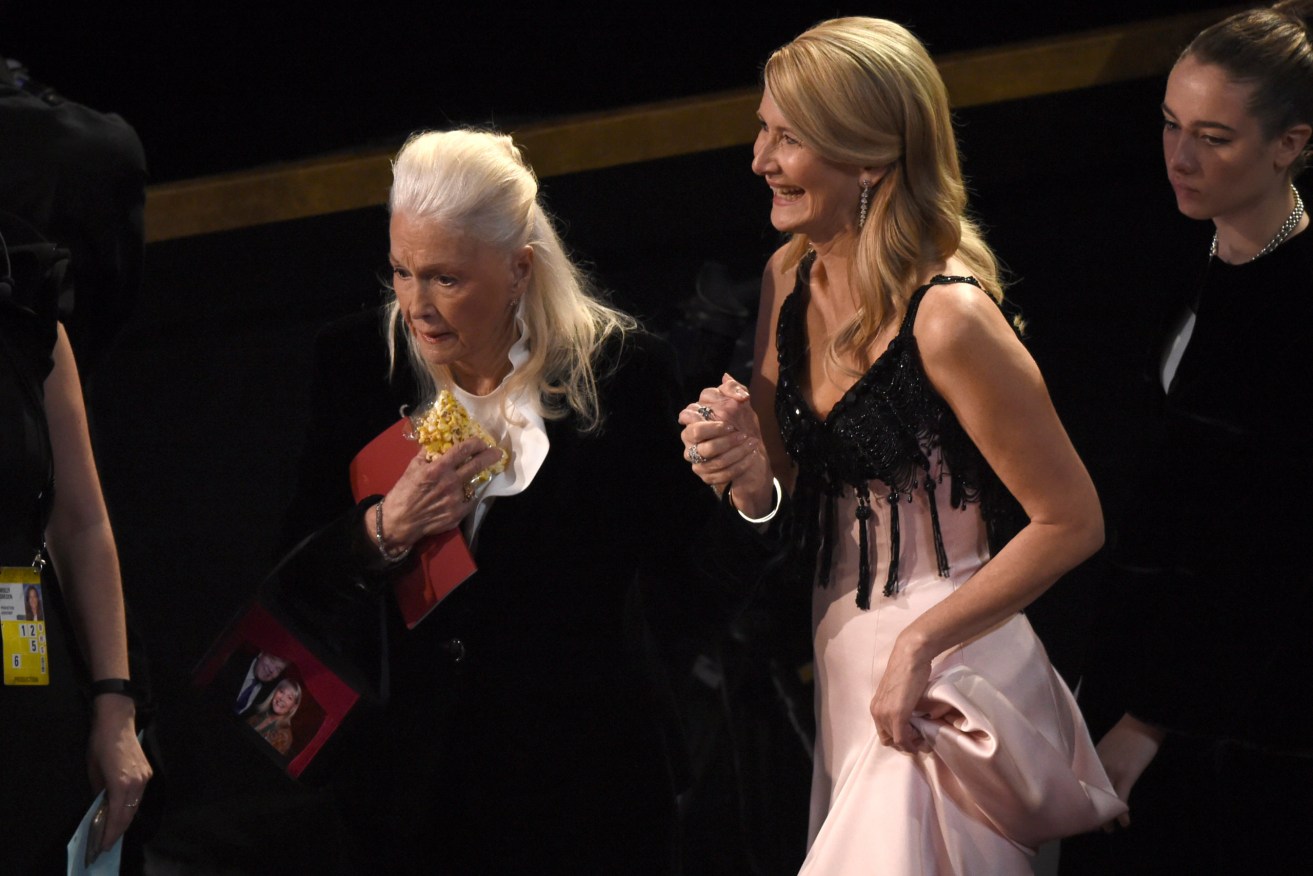Reality check: Has Hollywood really changed its attitude to women?
The Oscars celebrated films full of blood and trauma. But the everyday reality of pregnancy and childbirth is “too graphic” for the rest of us, according to the broadcaster.


Diane Ladd (left) with her daughter Laura Dern at the Oscars at the Dolby Theatre in Los Angeles, where Dern took home the best supporting actress statue. (Photo: AP Photo/Chris Pizzello)
Distraction is the greatest enemy of those who work from home.
To ensure I remain productive, my firm rule is no television or streaming, podcasts or radio in my study. As a freelancer, I am just one binge-watch of Fleabag away from not making my home loan repayments.
But the Oscars are an exception. In fact, watching the Oscars broadcast may even be an efficiency measure for journalists tasked with monitoring current affairs. That’s my excuse, anyway; it’s like a crash course on the state of pop culture, dressed up in designer labels.
And the 92ndAcademy Awards on Monday did not disappoint.
I got to see Natalie Portman, elegantly regal in a Maria Grazia Chiuri cape, which had been embroidered with the names of all the female directors who had been snubbed by the Oscars. That’s a lot of gold thread.
And I got to see Rooney Mara looking like she’d stretched a supersize pair of lacy knickers across her chest to match her bra – seriously, have a peek – even if the outfit was actually by Alexander McQueen. Billie Eilish appeared to have borrowed her mother’s Chanel pyjamas, while apparently Saoirse Ronan couldn’t decide which Gucci dress to wear so, bless her, she just wore both.
Thank goodness we had Charlize Theron in Dior and Scarlett Johansson in Oscar de la Renta to reassure us that classic Hollywood glamour hasn’t died.
Inside the Dolby Theatre, there were plenty more nuggets of unscripted entertainment.
I got to see Martin Scorsese catch some zzzzs while Eminem sang Lose Yourself in a surprise appearance, almost two decades after the rapper had no-showed and missed out on collecting an Oscar for the same song.
And what was going on with the unusual shine on Maya Rudolph’s face? Did her makeup artist walk out, insisting she had to leave early to beat the LA traffic to Vanity Fair’safter party?
Meanwhile, I got to see Leonardo DiCaprio’s girlfriend and I fretted about how the poor thing was managing, staying up so far past her bedtime.
But what I didn’t get to see was a woman climb out of bed and waddle across her bedroom in sagging undies, an enormous pad between her legs, while her tiny baby cried in the background. I didn’t see her wince as she lowered herself onto the toilet or see her dimpled belly droop from beneath her pyjama top.
And nor did several million Americans. Why? Because that footage, from an ad for personal care products designed for new mothers, was banned from airing during the Oscars. The broadcaster, the American ABC network, deemed it “too graphic with partial nudity and product demonstration.”
Consider that for a moment. An advertisement featuring a realistic depiction of a new mum – and, as a woman who has brought two children into the world, I can vouch for its eye-watering veracity – was apparently too shocking for film buffs and culture vultures tuning in to toast Hollywood.
It contained no overt images of blood or genitalia – you can watch for yourself on YouTube – but the mere suggestion of those things, in the context of the miracle of birth, is apparently not something we are ready to stomach in the 21st century.
Sometimes truth is stranger than fiction. Perhaps someone should make a movie about a society where the effects of childbirth on a woman’s body are considered too scandalous, too graphic and vile, to be contemplated by the public.
Meanwhile, the same public gathers to praise the likes of Quentin Tarantino, who has made shock and gore a directorial signature, and who was nominated this year for Once Upon a Time … in Hollywood, a film built around the night of the Manson Family murders.
And what about Scorsese? Are you telling me the good fellas who acclaim Goodfellas, Raging Bull, and Taxi Driver can’t cope with the sight of a woman’s body after childbirth?
The film 1917, considered a favourite to scoop the Oscars pool this year, is set in the gore-stained trenches of World War I. Even Parasite, the brilliant South Korean film that ultimately dominated, taking home four Oscars, culminates in a stomach-churning backyard massacre, the slaughter played out in front of children and teenagers.
None of this is intended as a criticism of the artists listed above; I’m a fan of much of the work mentioned here.
But what an amazing world it would be, if we could see the pain that occurs in everyday life and celebrate those who confront it like the heroes they are. Imagine lauding the strength of women who walk through that wall of agony, who bleed and endure an array of injuries to bring new life into the world, as much as we venerate those tough guys who beat up and end lives on the screen.
And it’s not just mothers. Everyday courage is as commonplace as everyday pain. Why not honour those who are ageing or facing death, rather than shutting them away from the public gaze, as if their withering bodies and declining faculties are an insult to us, rather than a signpost for where we are all headed?
Let’s recognise, too, all who show up for people in pain and suffering, rather than turning away and deeming their trauma “too graphic”.
Next year, may the Oscar go to reality, in all its brutal, beautiful forms.












